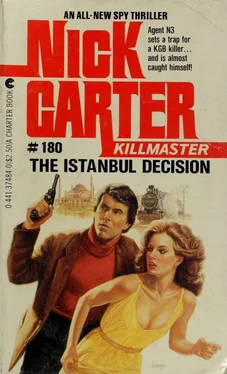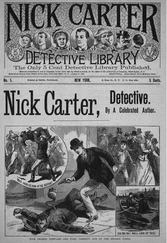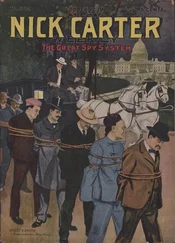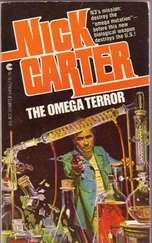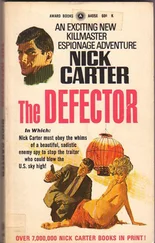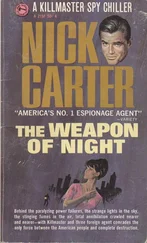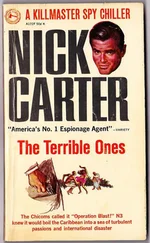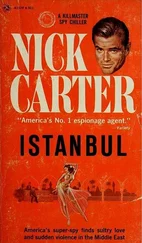"We'll just have to try. Tell me more about these checkpoints. How many guards are there and how well armed?"
For the next hour Carter pumped his host for every scrap of information he could ferret out on conditions along the wall — guards' timetables, gun emplacements, minefields, buildings nearby, their contents and accessibility, and at the end of the hour, Carter sat back thoroughly frustrated. "There must be some way over short of creating an international incident," he declared.
"Mein Herr, some of the best minds in Germany have been trying to crack that nut for more than thirty years. Believe me, the wall is virtually impregnable."
"I don't believe it," said Carter. "I refuse to believe it." He picked up a section of the tripod gun and rolled it absently in his hand. "Nice piece of work, this," he said. "Why don't you take me downstairs and show me your workshop? Maybe if we get our minds off the problem for a while, a solution will present itself."
They entered the basement down a stairway from the kitchen. Kliest turned on a series of overhead fluorescents, and Carter was amazed at the number of power tools the man had at his command. 'You must have a small fortune invested down here," he said.
"You've been talking to my wife," said Kliest. "She's always complaining about the money I spend on my crackpot inventions."
"What's in there?" Carter asked, indicating with a nod the door on the other side of the room.
"Materials."
Carter opened the door and switched on the light. Stacked on shelves and piled in wooden bins were sections of pipe, pieces of various metals, jars of paint, odd chunks of wood.
"Mostly what's left after I've put something together," said Kliest, peering in over his shoulder.
"What's this?" Carter asked, pulling something from a lower shelf.
"A nylon tent someone was throwing away. I haven't found a use for it yet."
Carter ran his hand over the material. "Lightweight, strong. It gives me an idea, Herr Kliest. Most definitely, an idea."
Carter led the way into the workshop to a drafting table that stood in a corner. Taking out a pad he made a quick sketch, then pushed it over to Kliest.
"It could be done," said Kliest, stroking his chin. "It's never been tried, and for that reason it may work. It'll take some time."
"Tonight?"
"Yes, tonight."
Carter stripped off his jacket and the two men set to work. It was after one o'clock by the time they finished.
"We should test it, of course," Kliest said, wiping his hands with a rag.
"We haven't the luxury," said Carter. "I'll fold it up and put it in its case. You get the car."
While they'd been working, Kliest had told Carter of a freight train that ran nightly into the Eastern Sector. It was not inspected because it was assumed no one would want to sneak into East Berlin. On the return trip, however, it was carefully gone over by guards and dogs, and over the years many people had been arrested trying to escape. The train slowed to a comfortable fifteen kilometers per hour under the Spandau Bridge as it steamed around the rail yards at Reinickendorf. The Spandau Bridge was only ten minutes from Kliest's house by car.
When Kliest returned downstairs, Carter was just finishing. On the floor at his feet lay a cylindrical object seven feet in length and ten inches in diameter covered with a lightweight nylon casing. Attached to either end was a shoulder strap to facilitate carrying.
The two of them stared down at the cylinder. "I'll bet anything it works," Carter said.
"You are betting, mein Herr. You are betting your life."
* * *
The Spandau Bridge is one of the few in the city to have survived World War IT. Decades of engine smoke have blackened it, and tons of coke dust have settled on it from the iron foundries across the canal. In the drizzling rain it gave off a sulphurous smell.
Carter looked down at the eighteen sets of tracks gleaming in the yard lights. "How do I know which track the train will come on?" he asked.
"Numbers eight and ten are through traffic," said Kliest. "All the others are for switching in the yard."
"Thanks," Carter said, then added, "for everything."
"Good luck, mein Herr."
"If you don't hear from me in twenty-four hours, burn my suitcase and everything in it."
Kliest nodded solemnly. They were standing on the bridge embankment just off the road. Kliest turned and trudged back up toward the car. In the distance a train whistle sounded, accompanied by the faint chattering of wheels against the rail.
Kliest stopped before reaching the top of the embankment and turned around. "Do you remember the address in the Eastern Sector?" he asked.
"Fourteen Mariendorfstrasse."
"And the Brandenburg?"
"At the end of Unter den Linden. That won't be hard to find."
Kliest nodded approval. The train was getting closer. "Good luck," he repeated.
Carter, with the long cylinder dangling from his back, began the arduous, hand-over-hand climb up the girders that formed the underside of the bridge.
The engine's headlight wobbled in the distance. It had rounded the curve at the far end of the yards and was beginning the straightaway that would bring it under the bridge.
Carter, watching its progress and realizing he might be late, began to scramble from girder to girder. The metal was wet from the rain and slippery underfoot. Twice the cylinder caught in the metal framework, and he had to stop and wrench it free.
The big engine passed underneath just as he got himself in place, rattling the bridge and nearly suffocating him with diesel exhaust. A string of boxcars followed with flat, hard roofs slick with rain. He watched them rattle by ten or so feet below and wondered if even fifteen kilometers an hour wasn't too fast. Next came flatcars loaded with farm equipment: tractors with sharp, gleaming plow blades. To fall onto these would mean certain death.
He looked down the train. Making the corner were a series of gondola cars loaded with coal. He disentangled the cylinder strap and let himself down until he was hanging from the girder by his hands. He let the first one pass, getting his timing on the second, then he let go. He hit the coal mound just below its peak, tumbled down it, and stopped with his back up against the well of the car. He pulled himself upright and took account of things. No bones broken, and the package seemed to be intact. He pulled it close to him, turned his collar up against the wind, and sat back to wait.
Twenty minutes later he felt the cars grinding to a halt. They had come to an outpost on the track. A barbed-wire barrier ten feet high extended up the embankment on either side, and on the track were a guardhouse and a gate. The gate was open and the train finally stopped just in front of it, no doubt for the guard and the engineer to exchange bills of inventory.
Ten minutes passed and the train started up again. Carter waited until he was well past the guardhouse, then jettisoned the cylinder and jumped, landing in the tall grass. He ran back and retrieved the cylinder, then scrambled up the embankment to the road.
He had made it. He was in the Eastern Sector. All that remained now was to find the building in which the meeting with Kobelev was scheduled to take place and scout it out. If Kobelev showed up at the appointed time, he'd kill him. If not and it was a trap, at least he'd know about it in advance.
Sister Marie-Therese kneeled before the crucifix in the chapel of the St. Denis Clinic and mumbled a Hail Mary. It had been a while since she'd prayed, and when she found herself rushing through it, she stopped and chided herself for a lack of piety. It was this new patient on the third floor. The young woman kept her running all day. After the seventh or eighth trip up those stairs, her joints got stiff.
Читать дальше
